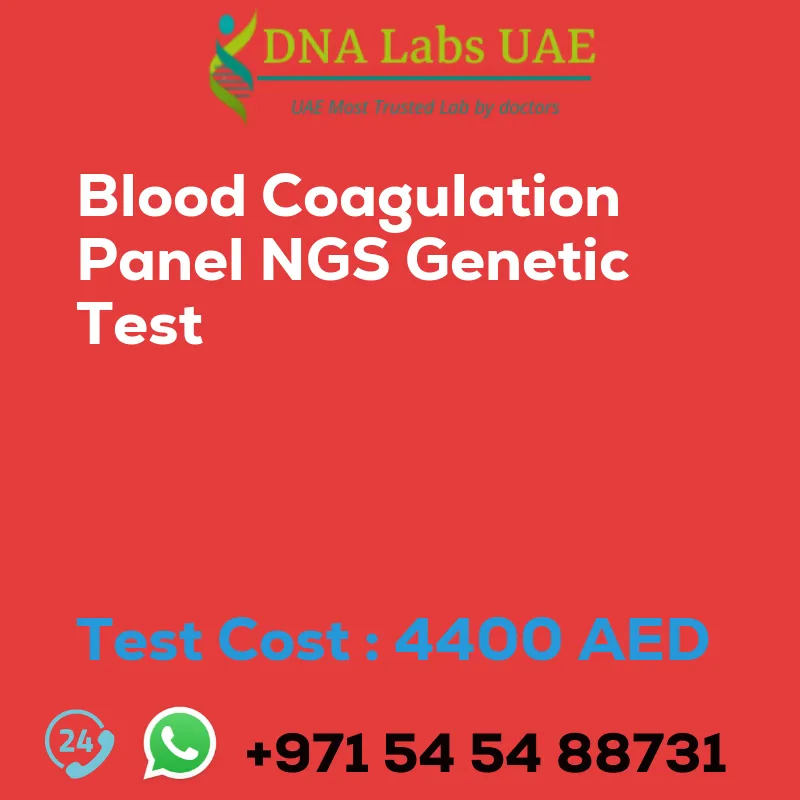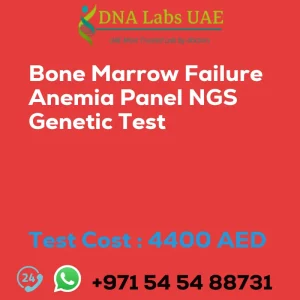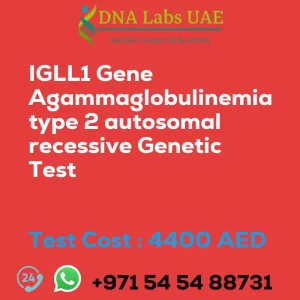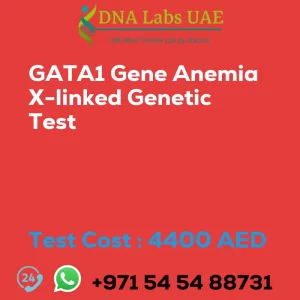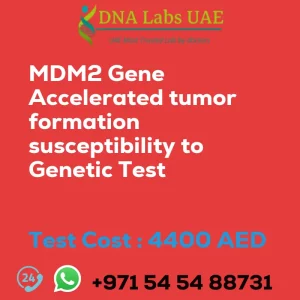Blood Coagulation Panel NGS Genetic Test
Cost: AED 4400.0
Test Name:
Blood Coagulation Panel NGS Genetic DNA Test
Components:
Price: AED 4400.0
Sample Condition:
Blood or Extracted DNA or One drop Blood on FTA Card
Report Delivery:
3 to 4 Weeks
Method:
NGS Technology
Test Type:
Hematology
Doctor:
Hematologist
Test Department:
Genetics
Pre Test Information:
Clinical History of Patient who is going for Blood Coagulation Panel NGS Genetic DNA Test. A Genetic Counselling session to draw a pedigree chart of family members affected with ACTN1, ACVRL1, ADAMTS13, ADAMTS2, ANKRD26, AP3B1, BLOC1S3, BLOC1S6, CCM2, CD36, CD40LG, CHST14, COL1A2, COL3A1, COL4A1, CTC1, CYCS, DIAPH1, DTNBP1, EFEMP2, ENG, F10, F11, F13A1, F2, F5, F7, F8, F9, FANCA, FGA, FGB, FGG, FLNA, GATA1, GFI1B, GNE, GP1BA, GP1BB, GP9, HOXA11, HPS1, HPS3, HPS4, HPS5, HPS6, IL2RG, ITGA2B, ITGB3, JAM3, KRIT1, LYST, LYZ, MPL, MYH9, P2RY12, PDCD10, PROC, PROS1, PTPN11, RBM8A, RUNX1, SBDS, SERPINC1, SLC35A1, SLC7A7, SMAD4, STIM1, THBD, VIPAS39, WAS
Test Details:
The Blood Coagulation Panel NGS Genetic DNA Test is a genetic test that analyzes an individual’s DNA to identify genetic variations that may affect blood clotting. This test can help diagnose inherited blood clotting disorders, such as hemophilia, von Willebrand disease, and thrombophilia. It can also provide information about an individual’s risk for developing blood clots, which can lead to conditions such as deep vein thrombosis and pulmonary embolism.
NGS (Next Generation Sequencing) is a technology used in this test to sequence multiple genes at once, allowing for a more comprehensive analysis of an individual’s DNA. The results of the test can help guide treatment and management strategies for individuals with blood clotting disorders or those at risk for developing blood clots.
It is important to note that genetic testing has limitations, and a positive result does not necessarily mean an individual will develop a blood clotting disorder or condition. Genetic counseling may be recommended to help individuals understand the implications of their test results.
| Test Name | Blood coagulation panel NGS Genetic DNA Test |
|---|---|
| Components | |
| Price | 4400.0 AED |
| Sample Condition | Blood or Extracted DNA or One drop Blood on FTA Card |
| Report Delivery | 3 to 4 Weeks |
| Method | NGS Technology |
| Test type | Hematology |
| Doctor | Hematologist |
| Test Department: | Genetics |
| Pre Test Information | Clinical History of Patient who is going for Blood coagulation panel NGS Genetic DNA Test. A Genetic Counselling session to draw a pedigree chart of family members affected with ACTN1, ACVRL1, ADAMTS13, ADAMTS2, ANKRD26, AP3B1, BLOC1S3, BLOC1S6, CCM2, CD36, CD40LG, CHST14, COL1A2, COL3A1, COL4A1, CTC1, CYCS, DIAPH1, DTNBP1, EFEMP2, ENG, F10, F11, F13A1, F2, F5, F7, F8, F9, FANCA, FGA, FGB, FGG, FLNA, GATA1, GFI1B, GNE, GP1BA, GP1BB, GP9, HOXA11, HPS1, HPS3, HPS4, HPS5, HPS6, IL2RG, ITGA2B, ITGB3, JAM3, KRIT1, LYST, LYZ, MPL, MYH9, P2RY12, PDCD10, PROC, PROS1, PTPN11, RBM8A, RUNX1, SBDS, SERPINC1, SLC35A1, SLC7A7, SMAD4, STIM1, THBD, VIPAS39, WAS |
| Test Details |
The Blood coagulation panel NGS Genetic DNA Test is a genetic test that analyzes an individual’s DNA to identify genetic variations that may affect blood clotting. This test can help diagnose inherited blood clotting disorders, such as hemophilia, von Willebrand disease, and thrombophilia. It can also provide information about an individual’s risk for developing blood clots, which can lead to conditions such as deep vein thrombosis and pulmonary embolism. NGS (Next Generation Sequencing) is a technology used in this test to sequence multiple genes at once, allowing for a more comprehensive analysis of an individual’s DNA. The results of the test can help guide treatment and management strategies for individuals with blood clotting disorders or those at risk for developing blood clots. It is important to note that genetic testing has limitations, and a positive result does not necessarily mean an individual will develop a blood clotting disorder or condition. Genetic counseling may be recommended to help individuals understand the implications of their test results. |

